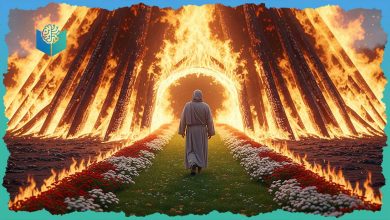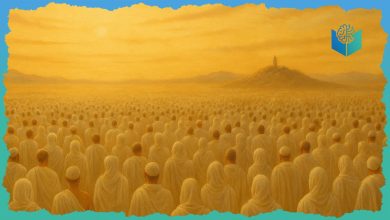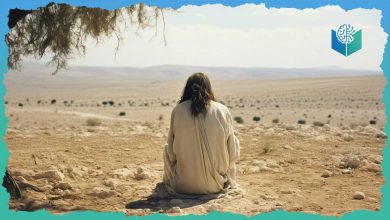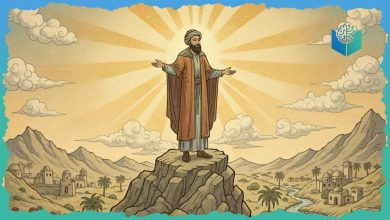The Prophet Muhammad’s Childhood and Early Life
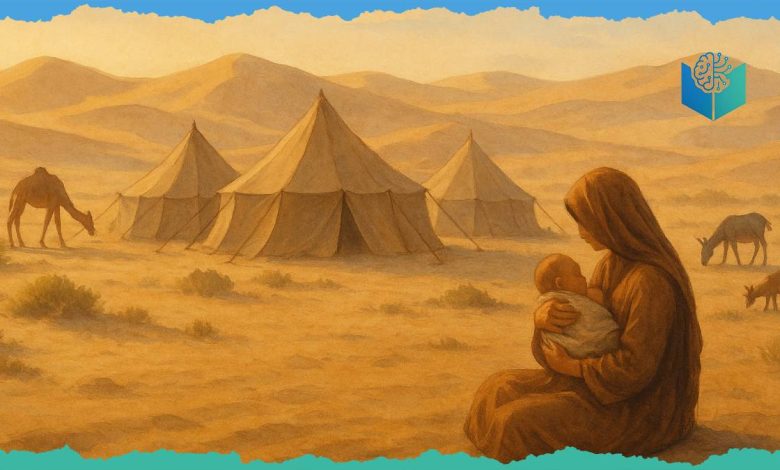
The Prophet Muhammad’s early life is one of simplicity, strength, and divine preparation. Every phase from his miraculous birth to his youth reveals how Allah shaped him to become a mercy for the worlds. His Seerah (biography) is not only a record of history but also a guide for moral conduct, compassion, and truth.
The Birth of the Prophet Muhammad (Peace Be Upon Him)
The childhood of the Prophet began in Mecca around the year 570 CE, a period known as the Year of the Elephant. That year, Allah protected the Kaaba from destruction by Abraha’s army, as described in Surah Al-Fil (105:1–5).
“And We have not sent you, [O Muhammad], except as a mercy to the worlds.” (Quran 21:107)
Born into the Quraysh tribe, Muhammad ﷺ entered a world filled with idolatry and moral decay. His birth was a light for humanity, a beginning that symbolized hope and mercy.
Family and Early Care in the Desert
After his birth, baby Muhammad was cared for by his grandfather, Abdul Muttalib, and later sent to the desert tribe of Banu Sa’d to be nursed by Halimah al-Sa’diyyah. This tradition helped children grow strong and learn eloquent Arabic.
The Prophet Muhammad’s early life with Halimah’s family was marked by blessings, rain returned to their land, and their animals thrived. Allah’s favor was evident even in his infancy.
The Prophet’s Early Losses and Divine Protection
Tragedy soon entered his young life. His father, Abdullah, had died before his birth, and at just six years old, Muhammad ﷺ lost his mother, Amina. On the return journey from Medina, she passed away, leaving him orphaned.
Later, his grandfather, Abdul Muttalib, took him in, only to pass away two years later. The Prophet was then cared for by his uncle, Abu Talib, who loved and protected him deeply.
“Did He not find you an orphan and give [you] refuge?” (Quran 93:6)
These hardships cultivated empathy, patience, and faith, qualities that would define his mission and leadership.

Lessons from His Orphanhood
Through his early struggles, the Prophet developed unmatched compassion for the weak and the orphaned. His later teachings on charity and care for orphans stem directly from these experiences.
In the life before prophethood, Allah was already shaping the Messenger’s heart to reflect divine mercy and justice.
Youth in Mecca: Honesty and Trustworthiness
As a young man, the Prophet Muhammad’s early life was defined by truthfulness. His honesty earned him the title Al-Amin (The Trustworthy).
He worked as a shepherd and later as a merchant, roles that taught patience, humility, and responsibility. In a society where corruption was common, his integrity stood out.
His behavior embodied the Quranic lifestyle, a life based on fairness, sincerity, and service to others.
The Prophet’s Reputation as Al-Amin
When disputes arose, even non-believers turned to him for judgment. His fair-mindedness and calm demeanor made him a respected figure across Mecca. Long before revelation, he was already living by the principles that Islam would later teach the world.
Marriage to Khadijah (RA): A Union of Love and Respect
At 25, Muhammad ﷺ began working for Khadijah bint Khuwaylid, a noble widow known for her intelligence and virtue. Impressed by his honesty and success, she proposed marriage.
Their marriage was one of peace and mutual admiration. Khadijah (RA) became his confidante, supporter, and the first believer in his message.
“And among His signs is that He created for you from yourselves mates that you may find tranquility in them.” (Quran 30:21)
The Prophet as a Husband
Their marriage teaches Muslims that love and faith go hand in hand. Their home was built on compassion and trust values that define a strong Islamic family. Through this example, we see how to live a Quranic lifestyle rooted in mercy.
Life Before Prophethood: Reflection and Solitude
Even before receiving revelation, Muhammad ﷺ spent time in solitude, contemplating creation and truth. He often retreated to the Cave of Hira, seeking peace from Mecca’s idol worship and moral decline.
During one of these moments of reflection, Allah sent the Angel Jibreel (Gabriel) with the first revelation:
“Read in the name of your Lord who created.” (Quran 96:1)
This marked the beginning of divine revelation and his mission as the final Messenger among the prophets of God.
The First Revelation and Its Meaning
The word “Read” (Iqra’) signifies knowledge, learning, and reflection values that remain central to Islam. This moment transformed the Prophet’s life, connecting his earlier purity and reflection with the divine command to spread truth.
Moral Character: The Foundation of the Seerah
The Prophet Muhammad’s biography emphasizes that good character is the foundation of faith. Even before revelation, he practiced honesty, humility, and kindness.
His fair judgment during the Kaaba’s reconstruction is one of the most famous examples. When tribes argued over who should place the Black Stone, he suggested they lift it together on a cloth restoring peace through wisdom.
“Indeed, Allah loves those who act justly.” (Quran 49:9)

The Prophet as the Living Quran
Aisha (RA) once described him by saying, “His character was the Quran.” Every word he spoke and every act he performed reflected divine guidance.
“And indeed, you are of a great moral character.” (Quran 68:4)
Through his actions, he showed that living by the Quran is the true measure of faith.
The Seerah as a Source of Guidance
The Seerah is not just history; it’s a lifelong guide for Muslims. By studying his life, we understand patience, integrity, and compassion in action.
Modern platforms like ayaat.ai offer a rich way to explore the Seerah and Quranic verses interactively, helping people strengthen their connection with Allah and His Messenger.
Studying the Prophet’s life helps believers discover Islam on a deeper, personal level, turning knowledge into daily practice.
How the Seerah Shapes Faith
By reflecting on his story, Muslims gain insight into humility, justice, and service to humanity. His example teaches us that true success lies in obedience to Allah and moral excellence.
The Prophet’s Early Connection to Allah
Even as a child, Muhammad ﷺ never engaged in idol worship or immoral behavior. Allah protected him from the influences around him, preserving his purity.
This divine protection shows that faith begins in the heart long before it manifests outwardly. It prepared him to receive revelation and fulfill his mission with clarity and strength.
Spiritual Preparation for Prophethood
Every experience from loss to solitude was part of Allah’s divine plan. Through them, the Prophet’s heart became a vessel for truth and mercy. His early life reminds believers that challenges often serve as preparation for a greater purpose.

The Prophet’s Early Life and the Message of Islam
The early years of Muhammad show that Islam was built on justice, compassion, and unity, not wealth or power. He cared for orphans, respected women, and valued honesty long before these became Islamic laws.
“And speak to people good [words] and establish prayer and give zakah.” (Quran 2:83)
His life illustrates that belief in Allah must reflect in daily actions and social ethics.
The Prophet’s Character as a Model for Humanity
His kindness to animals, humility toward the poor, and forgiveness toward enemies make him the best model for all believers. The Prophet Muhammad’s early life remains a timeless example of living with purpose and grace.
Inspiration for Modern Muslims
Today, the childhood of the Prophet offers guidance for people of all ages. His patience through hardship teaches endurance; his simplicity promotes gratitude; and his love for truth inspires authenticity.
By following his footsteps, we can align our lives with the teachings of the Quran, creating balance between faith and daily living.
Applying His Example Today
Whether through kindness at work, fairness in trade, or care for the needy, Muslims can reflect the Prophet’s values in every sphere of life. Platforms like ayaat.ai provide accessible ways to study his life and understand Islam in context.
From Orphan to Messenger of Mercy
The Prophet Muhammad’s biography reminds us that true greatness begins in humility. From being an orphan to becoming the Messenger of Allah, his story exemplifies faith, resilience, and divine guidance.
“Say, ‘Indeed, my prayer, my sacrifice, my living and my dying are for Allah, Lord of the worlds.’” (Quran 6:162)
His mission continues to inspire believers to live justly, act kindly, and spread mercy.
A Legacy That Lives On
His message, rooted in compassion and justice, continues to shape hearts across the world. The Seerah is not just the story of a man, but the living embodiment of divine mercy and truth.
Conclusion: The Light That Continues to Shine
The Prophet Muhammad’s early life is a reminder that divine purpose often begins in humble circumstances. His compassion, patience, and unwavering faith show what it means to live sincerely for Allah.
Learning from his story through ayaat.ai helps believers strengthen their connection to the Quran and follow the Quranic lifestyle, a life of truth, justice, and love for humanity.
Through his legacy, the light of guidance continues to shine inviting every generation to rediscover faith, humility, and the mercy of Allah.
Q&A
What was Muhammad's early life like?
Prophet Muhammad’s early life was marked by simplicity and hardship; he was orphaned at a young age but grew up known for his honesty and trustworthiness.
How did Prophet Muhammad start?
Prophet Muhammad’s mission began at age 40 when he received the first revelation from Allah through Angel Jibreel in the cave of Hira.
What is the life story of Prophet Muhammad?
The life story of Prophet Muhammad is one of faith, perseverance, and leadership—guiding humanity toward monotheism and justice through divine revelation.
Where did Prophet Muhammad spend his childhood?
Prophet Muhammad spent his childhood in Mecca, first cared for by his grandfather Abdul Muttalib and later by his uncle Abu Talib.


